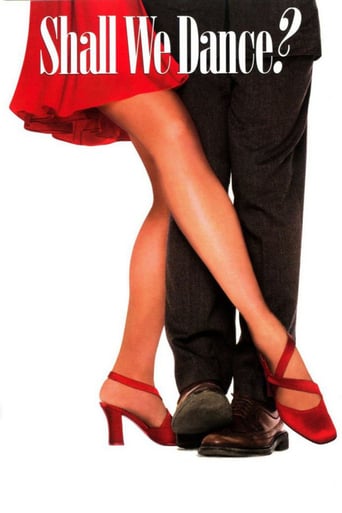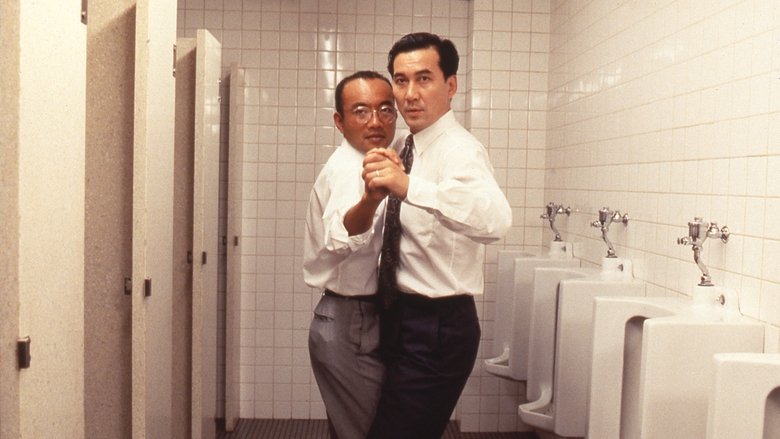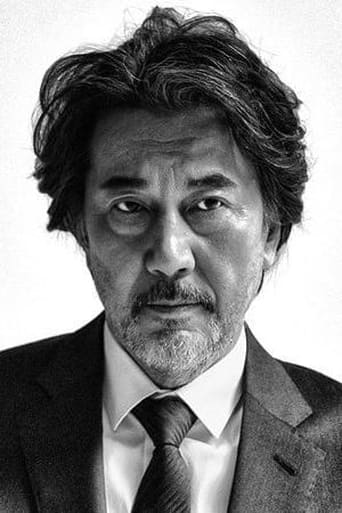

Shall We Dance? (1997)
A bored Japanese accountant sees a beautiful woman in the window of a ballroom dance studio. He secretly starts taking dancing lessons to be near her, and then over time discovers how much he loves ballroom dancing. His wife, meanwhile, has hired a private detective to find out why he has started coming home late smelling of perfume.
Watch Trailer
Cast


Reviews
You won't be disappointed!
This story has more twists and turns than a second-rate soap opera.
Let me be very fair here, this is not the best movie in my opinion. But, this movie is fun, it has purpose and is very enjoyable to watch.
The movie turns out to be a little better than the average. Starting from a romantic formula often seen in the cinema, it ends in the most predictable (and somewhat bland) way.
I believe I have seen this film three times. And every time I see it it does not fail to dazzle me. The acting is so superb, hitting all the right notes, getting the tone perfect. Each character in this film is just so divine. I highly recommend this to anyone to watch. It would be something good for all ages.The American remake with Richard Gere, Susan Sarandon and Jennifer Lopez is OK. However, that film takes a total different approach. The tone is very, very different. I am not dismissing the America version. However, a true film goer and lover needs to see the original version to really appreciate this remarkable, moving and terrific story.
Dancing: The vertical expression of a horizontal desire legalised by music. This quote may have been in the mind of middle aged salaryman Shohei (Kaji Yakusho) who realises that his life is unfulfilled as he watches dance instructor Mai (Tamiyo Kusakari) every night from his commuter train. In a moment of impulsiveness, he signs up for dance lessons to be near the sphinx like Mai. This might have been a movie about the budding romance between the somewhat improbably beautiful leads. Instead director Masayuki Suo focuses more on the excitement and passion of the ballroom than the attraction between Shohei and Mai, and makes a better, less predictable movie for it. Both the lead and supporting roles are played to near perfection, though Naoto Takenaka as the troll like Latin wannabe Mr. Aoki, shamelessly steals every scene he is in.Will Shoheis horizontal aspirations be fulfilled? Will his irredeemably dull wife discover his guilty secret? Will he go to the ball? You can be reassured that these questions will be answered to your satisfaction by the end of this endearingly sweet movie.
Shall We Dansu delves into the clash between modern day desires and Japanese cultural traditions. Dancing, for men in Japan, is seen as an embarrassment so when our protagonist, Sugiyama decides to take dancing lessons he is faced with a problem. Sugiyama is a respectable Japanese man that works as a businessman and has a wife and daughter, so it is out of the norm for him to take dancing lessons. Sugiyama decides to take the classes in secret and also acquire a love for the dancing instructor Mai, in secret. Sugiyama lives a double life from then on but has a new found passion for life. Masayuki shows the humor of Japanese customs and how people must keep their lives secret to avoid humiliation.The acting in Shall We Dansu was the best part of the movie. Mr. Aoiki stole the movie with his sharp turns while walking as well as Toyoko with her negative outlook on life. The movie was light-hearted and funny while still holding a message, that you should follow your desires even if society finds them humiliating. Another actor that deserves praise is Mai. Mai played the role of a dancer who lost her passion very well and her stiffness added to the suspense of the movie. Her complete disinterest in Mr. Sugiyama made for an attention-grabbing movie since you never knew how the movie would pan out.Masayuki really captured all elements of the film and made all the loose ends tie together at the end. The film was funny yet meaningful and showed the battles of contemporary Japan fighting to break lose of its traditional ties. Shall We Dansu shows the passion for dance and for holding your own desire against societies expectations.
Have you ever danced? For most the simple answer is yes, and then of course we each like to add either our stories or explanations. For women these stories are usually pleasant, either their first dance at school, or they actually had dance training when they were younger. But for men, the tables turn. If they had ever danced, they usually say they were forced into it, that it was "only for a little while" or that they simply hated it. We all know that dancing cannot possibly be that horrendous or painful, then why do so many men find it necessary to cover-up their dancing, especially if it was out of personal interest. Now, imagine yourself in a society where dance is socially forbidden, not in any shape or form, not between husband and wife and most definitely not out of personal interest. It is considered shameful, embarrassing but it is an escape, a way to enter an alternate universe of your life in a split second, would you do it? What if dancing forced you into secrecy and as hard as you tried to deny it, it became your passion. Would you let dancing go because of society or would you keep it close to your heart forever, if your heart deems it necessary?Mr. Sugiyama was a successful Japanese businessman, a "salary-man" who stayed late at work and went out with co-workers afterward, a custom necessary for your success within a company. Usually coming home late, he knew that tomorrow was going to be the same as the day before and the 20th day from now; his life has been set for him. On the train on the way back home he notices a young woman looking out a window on the top floor of a building. She catches his attention immediately and after many debates with himself, over several days, he decides to come see her, only to find out it is a dancing establishment. He gives it a chance nonetheless, and once he finds Mr. Aoki, a fellow co-worker, hiding behind a wig at this same establishment, he starts to gain confidence and awareness that maybe it is alright to enjoy dance. He becomes engrossed in it, disciplining every aspect of his dancing whether on the train or even at work, and dance gives life to him, showing in simply the way he rides his bike. Yet Mai, the woman who first caught his attention and an instructor within the school, has seemed to lose this passion that he just found for dance. It takes one dancing competition, in which Mr. Sugiyama participates and Mai instructs him, for both of them to face their fears, define their personal meaning of dance, and determine what is truly important and necessary in their lives. Maybe not everyone can relate to dancing, but there may be something that each of us has in our hearts to do that we are simply forbidden. Moreover, I believe this picture correctly portrays the passions of humankind, the lack thereof, and the effects of both on the human being. The director allows us to see Mr. Sugiyama's transformation, how Mr. Sugiyama first develops his passion for dance showing no longer just at the dance school, but everywhere else, at work and at home. In contrast, the director shows Mai, an almost stoic woman who has this opportunity to dance and yet it no longer brings life to her. The acting is wonderful and we are left wondering what it is that happened to her and whether Mr. Sugiyama will continue to dance. However, something seems to be missing in this film. I believe the director could have given more life to the picture itself, especially when representing something so expressive as dance. It may be that factor that I have danced before, but other than some short scenes at the beginning or end, this picture lacked an artistic aspect to give life to the passions of those involved. There is only so much that a storyline and acting can provide, and the artistic element fills in the vacancies. For me, the director failed to do so, both within the dance studio and during the competitions.




